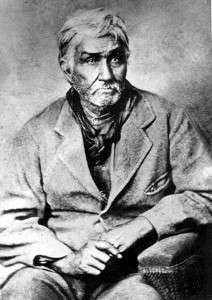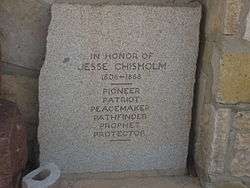Jesse Chisholm

Jesse Chisholm (circa 1805 - March 4, 1868) was a mixed blood Cherokee fur trader. His name is most famous because of the namesake cattle trail, which he originally scouted and developed to supply his various trading posts among the Plains Indians in what is now western Oklahoma. Although Chisholm died before the heyday of the Texas-to-Kansas cattle drives, he was nevertheless a participant in several important events in Texas and Oklahoma history.
Chisholm's father Ignatius was of Scottish descent, and his mother Martha (née Rogers) was a Cherokee from the region of Great Hiwassee. He moved with his mother to Oklahoma during a period when Cherokees were migrating voluntarily. In 1826 Chisholm became involved in a gold seeking party, who blazed a trail and explored the region to present day Wichita, Kansas. In 1830 he helped blaze a trail from Fort Gibson to Fort Towson. In 1834 he was a member of the Dodge-Leavenworth Expedition, who made the first contact with the southern plains Indians on behalf of the United States federal government.[1]
In 1836 Chisholm married Eliza Edwards. They resided in the area of her father's trading post on the Little River near its confluence with the Canadian River where Jesse worked in the Indian trade.

Chisholm was an interpreter and general aid in several treaties between the Republic of Texas and local Indian tribes, as well as between the United States federal government and various tribes (after Texas was annexed). This diplomatic work spanned 20 years, between 1838 and 1858.[2] During this period he also continued in the Indian trade, trading manufactured goods for peltry and for cattle.
During the Civil War he mostly remained neutral. Many residents of Indian Territory feared they might be massacred, either intentionally or as an accident of war, if either side attempted to contend for control of the territory. He led a band of refugees to the western part of the territory. For some time they suffered privation, as the trade had dried up during the war as well.
At the end of the war he settled permanently near present-day Wichita, and recommenced trade into Indian Territory. He built up what had been a military and Indian trail into a road capable of carrying heavy wagons for his goods. This road became known as Chisholm's Trail. Later when the Texas-to-Kansas cattle drives started, the users of the trail re-dubbed it the Chisholm Trail.[3]
He died at his last camp near Left Hand Spring in 1868 and is buried there.[4]
See also
References
- ↑ Hoig, Stan. "CHISHOLM, JESSE (ca. 1805-1868)". Encyclopedia of Oklahoma History and Culture. Oklahoma Historical Society. Retrieved August 23, 2014.
- ↑ Richardson, T. C. "CHISHOLM, JESSE". The Handbook of Texas Online. Texas State Historical Association. Retrieved August 23, 2014.
- ↑ Rossel, John (February 1936). "The Chisholm Trail". Kansas Historical Quarterly. Kansas Historical Society. 5 (1): 3–14. Retrieved August 23, 2014.
- ↑ "Founder of Chisholm Trail dies — This Day in History — 3/4/1868". History.com. Retrieved August 23, 2014.
Further reading
- "A Guide to the Jesse Chisholm Papers, 1859-1880, 1928". Texas Archival Resources Online. The University of Texas at Austin. Retrieved August 23, 2014.
- Gaylord, Kristina (June 2011). "Chisholm Trail". Kansaspedia. Kansas Historical Society. Retrieved August 23, 2014.
- Hoig, Stan (1991). Jesse Chisholm, Ambassador of the Plains. Niwot, CO: University Press of Colorado. Retrieved August 24, 2014.
- Hoig, Stan (Winter 1988–1989). "Jesse Chisholm: Peace-maker, Trader, Forgotten Frontiersman". The Chronicles of Oklahoma. 66. Retrieved August 24, 2014.
- Hoig, Stan (Summer 1989). "The Genealogy of Jesse Chisholm". The Chronicles of Oklahoma. 67. Retrieved August 24, 2014.
- Taylor, T. U. (1939). Jesse Chisholm. Bandera, TX: Frontier Times. Retrieved August 24, 2014. An unverified transcription is available on line.